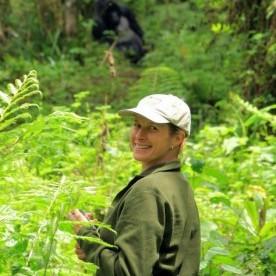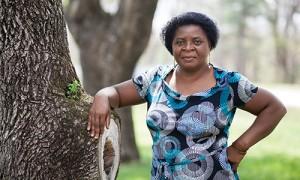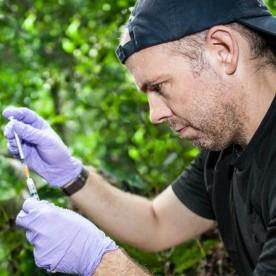-
About
- Leadership & Faculty
- News & Events
-
Academics
- Graduate
- Advanced Clinical Training
- Continuing Education
- Academic Offices
-
Student Life
-
Research
-
Hospitals & Clinics
- Emergency Care
- Hospital Services
-
Community Outreach
- Volunteer
IVM Faculty
Felicia Nutter
V93, Ph.D. Comparative Biomedical Sciences
Smart. Tough. Dedicated. Dr. Felicia Nutter is a natural fit as the Director of International Veterinary Medicine. Beyond her academic qualifications (D.V.M., Ph.D. in Comparative Biomedical Sciences, and a Diplomate of the American College of Zoological Medicine), she has a long resume of hands-on fieldwork and leadership from East Africa to Southeast Asia, California to New England. She is known for her dedication to her work, and to the people she works with. Veterinary students with an interest in IVM will always find an open door, and a knowledgeable resource in Dr. Nutter.
As a young veterinary student at Cummings School, Dr. Nutter was interested in wildlife medicine, and completed an international research project studying the gastrointestinal parasites of chimpanzees and baboons in Gombe Stream National Park in Tanzania. Following graduation, she completed a Fulbright Fellowship there, continuing the research she started in veterinary school. Years later, she returned to Central and East Africa to serve as the regional field veterinarian for the Mountain Gorilla Veterinary Project in Rwanda, Uganda, and the Democratic Republic of Congo. During her 4-year tenure, in addition to responding to mountain gorilla health emergencies, she oversaw domestic animal health and research programs, co-founded an orphan gorilla care program, and helped start an employee health program.
In 2009, Dr. Nutter returned to Cummings School as a Research Assistant Professor in the Department of Infectious Diseases and Global Health and was appointed Senior Technical Veterinary Officer for RESPOND, part of the USAID Emerging Pandemic Threats Program. She continues her leadership role as part of the multidisciplinary team on the One Health Workforce project, tasked with creating more effective cooperation between veterinarians, doctors, and public health officials, building capacity to prevent, detect, and respond to outbreaks of infectious diseases.
As director of the International Veterinary Medicine program, Dr. Nutter lends her experience and expertise in International Veterinary Medicine to her students. She explains, “The hands-on, immediate impact of helping injured or sick animals is very satisfying. But to conserve populations, we need to identify and solve problems on a larger scale. Animal, human, and environmental health are bound together. The interdisciplinary collaboration between physicians, researchers, veterinarians, conservationists, public health officials, and educators is essential to ensuring sustainable global health.”
Hellen Amuguni
D.V.M., MA International Development, Ph.D. Infectious Disease
With a D.V.M., MA, and Ph.D. in Infectious Disease, Dr. Hellen Amuguni is a true One Health scientist. Her perspective as a gender specialist, complements her scientific knowledge of human and animal disease with actionable insight into how culture and gender roles affect the spread of disease. Her unique qualifications are put to good use as a teacher, mentor, and technical advisor on the USAID One Health Workforce project in eight countries in Africa.
As a young veterinarian in her native Kenya, Dr. Amuguni spent time in the field working with farming communities. It was through this early work that she learned that in order to be a successful veterinarian, you must also be a strong communicator, and humanitarian. Her passion for her work helping rural communities inspired her to earn a Master’s degree in International Development.
After returning to Africa to work in the field, Dr. Amuguni decided to pursue a Ph.D. in Infectious Disease at Cummings School under renowned enteric pathologist, Dr. Saul Tzipori. Since earning her Ph.D., Dr. Amuguni has served as a technical advisor on the USAID One Health Workforce project for Africa, wherein she advises One Health initiatives in eight African countries.
With her diverse academic expertise, field experience, and strong soft skills, Dr. Amuguni is a favorite among student and faculty alike.
Chris Whittier
V97, Ph.D. Population Medicine
Chris Whittier, V97, uses his vast experience and knowledge in the fields of population medicine, veterinary medicine and One Health, to direct the MS in Conservation Medicine program (MCM). In addition to teaching courses, mentoring students, and directing the MCM program, Chris is actively involved in global research and conservation efforts.
While studying abroad in Tanzania during his junior year of college, Dr. Whittier had his first exposure to wild mountain gorillas. Inspired by the efforts of conservationists in the field, he went on to veterinary school with a focus on international medicine. His interest in great apes continued, and he returned to Tanzania as a veterinary student to work with renown primatologist and conservationist, Jane Goodall.
Dr. Whittier went on to earn his D.V.M. and Ph.D. in population medicine, with a focus on the diagnosis and epidemiology of infectious disease in wild gorillas. He has since put his expertise to work as a regional field veterinarian with the Mountain Gorilla Veterinary Project) in Africa, as a contributor to the USAID PREDICT Project, and as director of the MCM program at Cummings School.
Whether he’s teaching courses, mentoring students, conducting research, or flying to the aid of mountain gorillas at a moment’s notice, Dr. Whittier’s work is marked by passion and enthusiasm.


